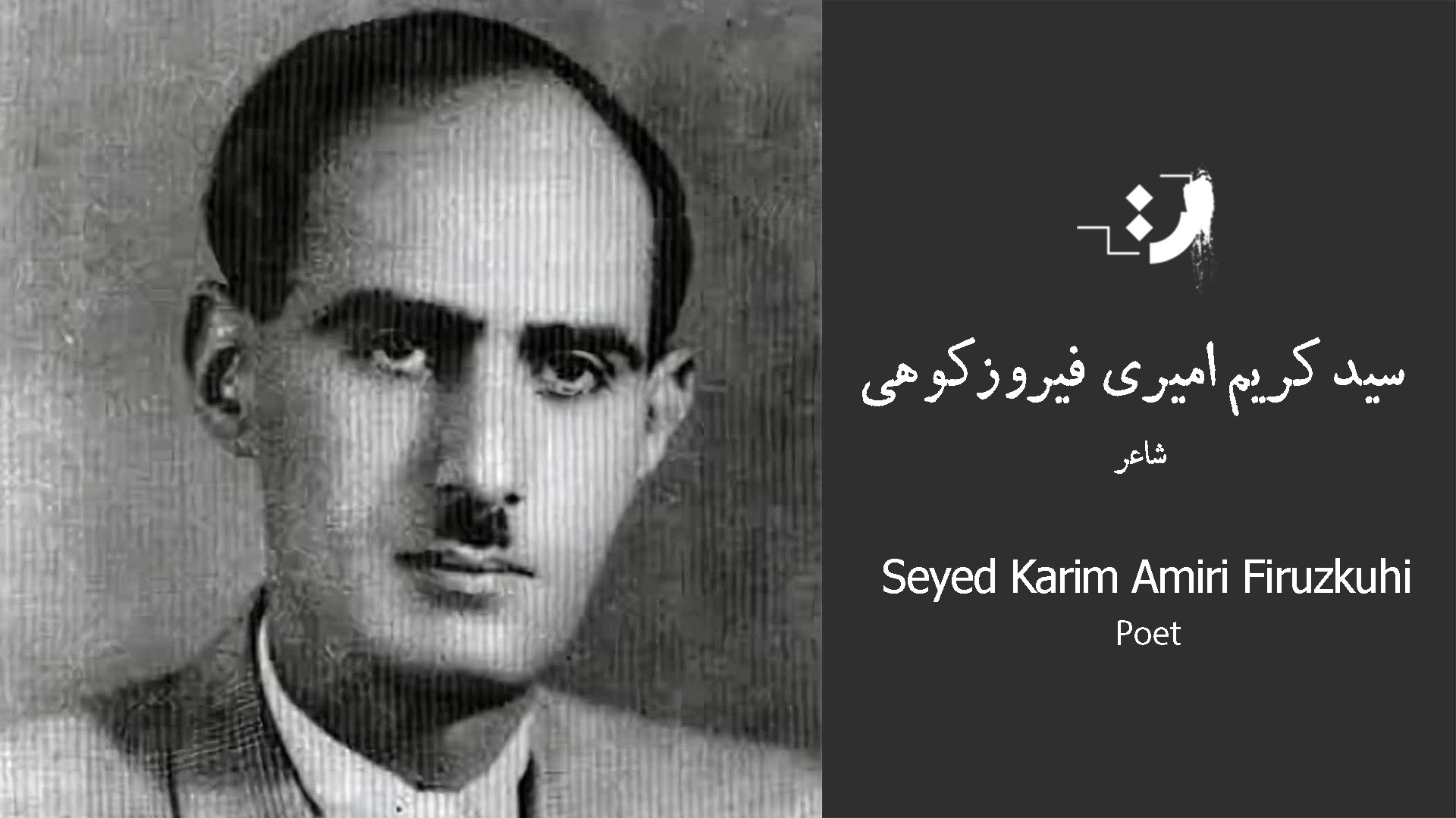Seyed Karim Amiri Firuzkuhi

Biography
Seyed Karim Amiri Firuzkuhi
Life
Seyed Karim Amiri Firuzkuhi, known by the pen name Amir, was an Iranian poet of the 14th century Solar Hijri era. He was born in 1909 (1288 SH) in Farahabad, Firuzkuh, and passed away in 1984 (1363 SH) in Tehran.
Amiri Firuzkuhi was the son of Seyed Mostafa Quli Montazam al-Dawla, a statesman of the Qajar era who had traveled to Europe during the reign of Mozaffar al-Din Shah and was well-acquainted with modern civilization. His great-grandfather, Amir Mohammad Hossein Khan Sardar, was among the conquerors of Herat and the founder of the Firuzkuhi Charity School for Orphans in Tehran.
At the age of seven, Amiri Firuzkuhi moved to Tehran with his family. However, his father passed away in the same year, leaving him under the care of his mother. He pursued his early education in Tehran, attending Siruz, Servat, Soltani, and the American College. He later studied philosophy, logic, and theology under prominent scholars such as Aqa Sheikh Abd al-Nabi Nuri, Aqa Seyed Hossein Mojtahed Kashani, Seyed Mohammad Kazem Assar, and Mirza Khalil Kamarei.
Literary Career
Amiri Firuzkuhi was a distinguished poet of ghazal and qasida and was particularly influenced by the Indian style (Sabk-e Hindi), which he admired through his deep appreciation of Saib Tabrizi. His ghazals are known for their clarity, fluidity, and thematic depth, while his qasidas exhibit eloquence reminiscent of Khaqani and the melancholic tone of Mas’ud Sa’d Salman. His poetry reflects philosophical contemplation and poetic nostalgia, often expressing a sorrowful view of life’s transience.
His works include ghazals, qasidas, and mathnavis, and he was also skilled in Arabic literature, composing poetry in Arabic as well. His command over classical Persian and Arabic poetry allowed him to craft verses enriched with rhetorical finesse, Qur’anic references, and profound imagery.
Amiri Firuzkuhi was closely associated with renowned poets and scholars such as Rahi Mo’ayyeri, Bahmanyar, Mohammad Ali Bamdad, Vahid Dastgirdi, and Sadegh Hedayat. He also had strong ties with Persian classical musicians, including Habib Sama’i, Abolhassan Saba, and Abdolhossein Shahnazi.
Work and Contributions
His admiration for Saib Tabrizi was not limited to poetic inspiration; he also prepared a critical edition of Saib’s Divan with a scholarly introduction, in which he argued that Saib’s style should be categorized as Isfahani rather than Indian.
Amiri Firuzkuhi’s poetry totals around 3,000 couplets. His ghazals are delicate yet profound, while his qasidas merge the classical Khorasani style with the innovations of later Persian poetry. His mathnavis are reminiscent of Nezami’s expressive storytelling.
His published works include:
A critical edition of Saib Tabrizi’s Divan
Two volumes of his own Divan
Translations of classical Arabic texts, including excerpts from Nahj al-Balagha
A philosophical treatise published in Javidan-i Khirad
Legacy
Amiri Firuzkuhi lived a life dedicated to poetry and literature, maintaining a distance from government positions despite serving as the head of the Documents Registration and Real Estate Administration between 1947 and 1957. Following his resignation, he pursued a freelance literary career.
His home in Tehran became a cultural hub where intellectuals and artists, such as Ahmad Mahdavi Damghani, Habib Yaghma’i, and Gholam Hossein Ra’di Adarkhshi, gathered to discuss poetry, art, and literature.
Amiri Firuzkuhi passed away in Tehran and was laid to rest in the shrine of Shah Abdol-Azim. After his passing, his daughter, Amir Banoo Karimi, published his Divan in two volumes, making his heartfelt ghazals accessible to future generations.
- Birthday: 1909
- Death: October 10, 1984
- Birthplace: Firuzkuh, Tehran, Iran
Poet
